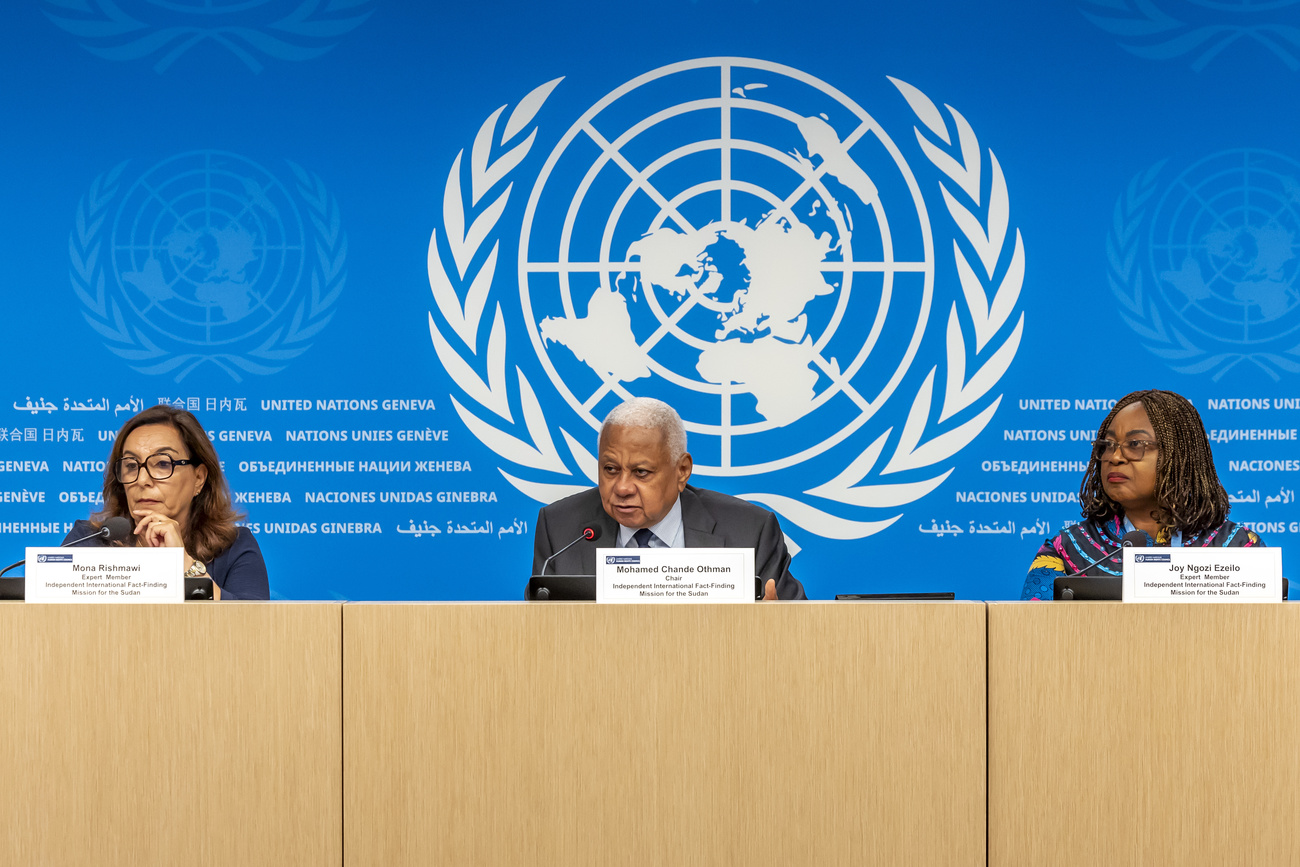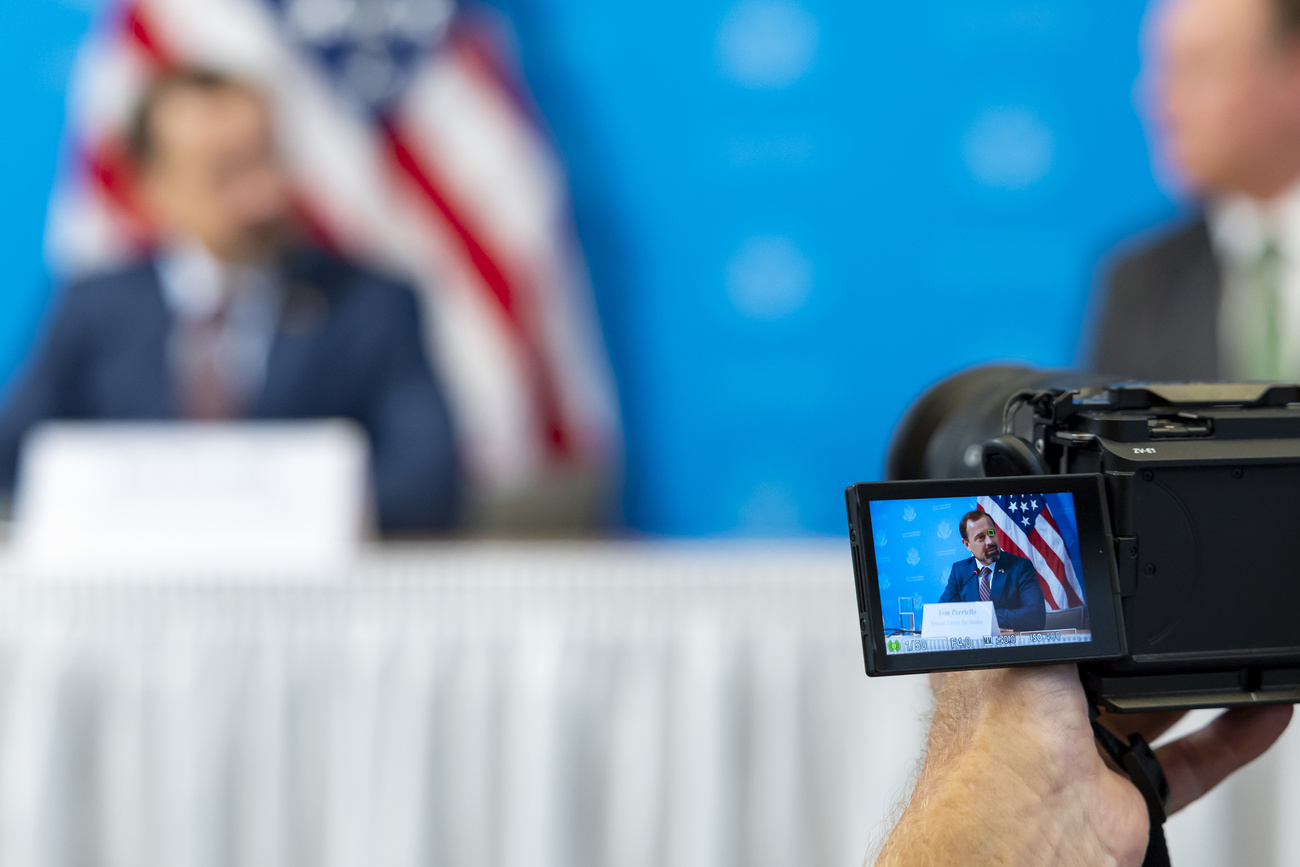
First UN fact-finding report on Sudan released in Geneva

Numerous acts amounting to crimes against humanity and war crimes have been committed in Sudan, according to UN investigators. In their report on Friday in Geneva, they called for the deployment "without delay" of an Independent Force to Protect Civilians and an International Judicial Mechanism.
The International Fact-Finding Mission has singled out the Rapid Support Forces (RSF) more than the army. The paramilitaries and their allied militias are accused of acts amounting to crimes against humanity, including murder, torture, slavery, rape, sexual slavery, ethnic persecution and forced displacement.
+Get the most important news from Switzerland in your inbox
The RSF also carried out executions, torture, rape, destruction of homes and looting against non-Arab communities such as the Masalit in West Darfur. However, the mission only briefly mentions the siege of El-Fasher in Darfur by the military and the famine.
This situation “could constitute war crimes and crimes against humanity”, Mona Rishmawi, a member of the International Fact-Finding Mission, told the press. It is “extremely worrying” and “aggravates” several of the crimes denounced by the investigators, she added.

More
Sudan: everything you need to know about the Geneva negotiations
General Abdel Fattah al-Burhane’s army, which has been opposing them for over a year, is responsible for the alleged war crimes of murder, mutilation, torture and other degrading acts. More investigations need to be carried out into the sexual violence perpetrated by the military, despite indications, says the mission.
Tens of thousands of victims
“The seriousness of these findings calls for urgent and immediate protection”, said the Mission’s Chairman Mohamed Chande Othman. Both sides have also carried out indiscriminate attacks against civilians and civilian infrastructure such as health centres. They have also committed violations against children, including mutilation.
Rapes, arbitrary arrests and detentions are also mentioned in the report. The Mission calls on the parties to the conflict to immediately cease their assaults on civilians and to respect international humanitarian law (IHL).
In addition to an independent force, it calls for the launch of a separate international judicial mechanism to complement the International Criminal Court (ICC), with which the authorities must cooperate. The ICC’s jurisdiction should also be extended from Darfur to the whole of Sudan.
The Mechanism could be a special court, a hybrid court or follow other formats. The mission has compiled files on the presumed perpetrators “but we are not a prosecuting body”, insists its chairman. The force, for its part, could be African, UN or by agreement, said Rishmawi. “Several institutions have a responsibility to put an end to the conflict, including the UN Security Council,” she said.
The investigators also want an Office for Victim Support and Reparation. “These conclusions should serve as a wake-up call for the international community,” added Rishmawi.
Call for a ceasefire
The conflict in Sudan has claimed tens of thousands of victims. Some regions of Darfur are facing famine. More than half of Sudan’s population is in need of humanitarian assistance. More than 10 million people have fled the violence, most of them inside the country.
A few weeks ago, talks led by the United States and co-organised by Saudi Arabia and Switzerland were held in Geneva in an attempt to bring about a ceasefire. In vain, as the army participated only remotely
It did, however, concede new commitments to open humanitarian routes, notably from Chad, to supply the population of Darfur. The town of El-Fasher is under siege by the RSF, causing concern to a large part of the international community.
For the time being, however, there has been little follow-up to the promises made on the ground. However, Othman welcomed the reopening of the Adré crossing from Chad. A “lasting ceasefire” is also needed, insists a member of the Fact-Finding Mission, Joy Ngozi Ezeilo.
Because of the cash crisis at the UN, the three investigators were only able to start their mandate at the beginning of the year. The report covers the investigations carried out between January and August. It recommends extending the arms embargo already in force in Darfur to the whole of Sudan. The mission adds that those who supply arms may be complicit in serious violations of human rights and IHL.
Adapted from French by DeepL/ac
This news story has been written and carefully fact-checked by an external editorial team. At SWI swissinfo.ch we select the most relevant news for an international audience and use automatic translation tools such as DeepL to translate it into English. Providing you with automatically translated news gives us the time to write more in-depth articles.
If you want to know more about how we work, have a look here, if you want to learn more about how we use technology, click here, and if you have feedback on this news story please write to english@swissinfo.ch.

In compliance with the JTI standards
More: SWI swissinfo.ch certified by the Journalism Trust Initiative

























You can find an overview of ongoing debates with our journalists here . Please join us!
If you want to start a conversation about a topic raised in this article or want to report factual errors, email us at english@swissinfo.ch.